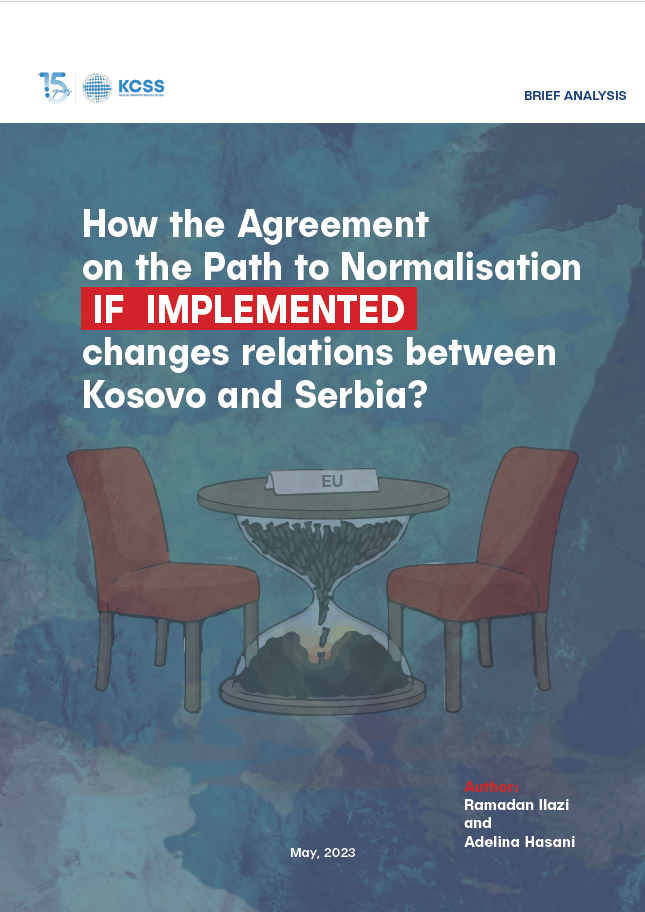10/05/2023

Kosovar Centre for Security Studies (KCSS)
Qendra Kosovare për Studime të Sigurisë
Ramadan Ilazi and Adelina Hasani
• The Agreement on the Path to Normalisation between Kosovo and Serbia (APN), creates a possibility for a new state of relations between the two countries, albeit a new status-quo. Through the APN Serbia practically recognizes statehood attributes of Kosovo, by accepting national symbols, as well as the obligation to respect the territorial integrity and sovereignty of Kosovo, and treat Kosovo on the basis of the principles of the Charter of the United Nations (UN), and the Treaty of the European Union (TEU). The APN also makes Kosovo and Serbia responsible to preserve the peace and “contribute to fruitful regional co-operation and security in Europe”.
• The new state of relations (new status-quo), is dependent upon effective implementation of the Agreement on the Path to Normalisation. Without effective implementation, the APN becomes another conflict management tool, rather than an instrument for affirmative normalization of relations. The current trends are not optimistic for implementation and suggest that both parties, especially in Serbia, are focused on undermining the APN and its impact;
• The Agreement on the Path to Normalisation between Kosovo and Serbia, while introduces significant affirmative changes in the Kosovo-Serbia relations – if implemented – it also includes elements that can potentially create legal and political hurdles for the Kosovo government. The APN marks the first time, that a Kosovo government accepts Serbia’s position on the status question. The preamble of the APN includes the following sentence: “[…] without prejudice to the different view of the Parties on fundamental questions, including on status questions”, but there is not reference to the ICJ advisory opinion on the declaration of independence of Kosovo. Based on the precedents set by previous agreements/arrangements between Kosovo and Serbia in the framework of the EU-facilitated normalization dialogue, whenever the phrasing “without prejudice to the status” was used, a reference to the ICJ advisory opinion on declaration of independence was also included;
• The Agreement on the Path to Normalization of relations between Kosovo and Serbia has been welcomed by the European Council, which marks the first time that all 27 Member States of the European Union (EU) have endorsed an agreement from the normalization dialogue. The European Council conclusions note that APN puts “the relationship between both parties on a new and sustainable basis as a historic chance that should be seized by both parties” and urges implementation
• In other words, if the optimistic scenario of all five recognizing Kosovo fails, then Spain and Cyprus should move towards the current Greek position on Kosovo, while Greece itself, alongside Slovakia and Romania, should move to formal recognition. In Kosovo there are concerns about the position of Romania, which is seen as moving further away from constructive engagement with Kosovo and recognition and closer to the position of Spain.
• The role of the European Union (EU) as a facilitator in the dialogue for normalization of relations between Kosovo and Serbia, has arguably evolved into an arbiter, as a result of the Agreement on the Path to Normalization (APN), and the implementation roadmap. This means that for Kosovo and Serbia implementation of the provisions from the APN is a contractual obligation towards the EU in the framework of the European integration process. This arrangement was necessitated by the refusal of Serbia to sign the APN, although it agreed to it verbally. In this context, when neither side has signed the APN, the role of EU as an arbiter is a must, in order to guarantee implementation by both countries.
• The transparency of the process of the dialogue for normalization of relations with Serbia has declined in Kosovo. The Kosovo government has limited its reporting on the normalization dialogue both to the public as well as to the Kosovo Assembly. In addition to this, Kosovo government has acted against previous precedents of asking the Kosovo Assembly for consent when accepting a high-level agreement with Serbia, such as the case from 2013 with the “First agreement of principles governing the normalization of relations”.
• The implementation annex to the Agreement on the Path to Normalisation of relations between Kosovo and Serbia agreed in Ohrid in March, is vague, and lacks concrete measures to ensure implementation of the agreement, including sequencing of actions.